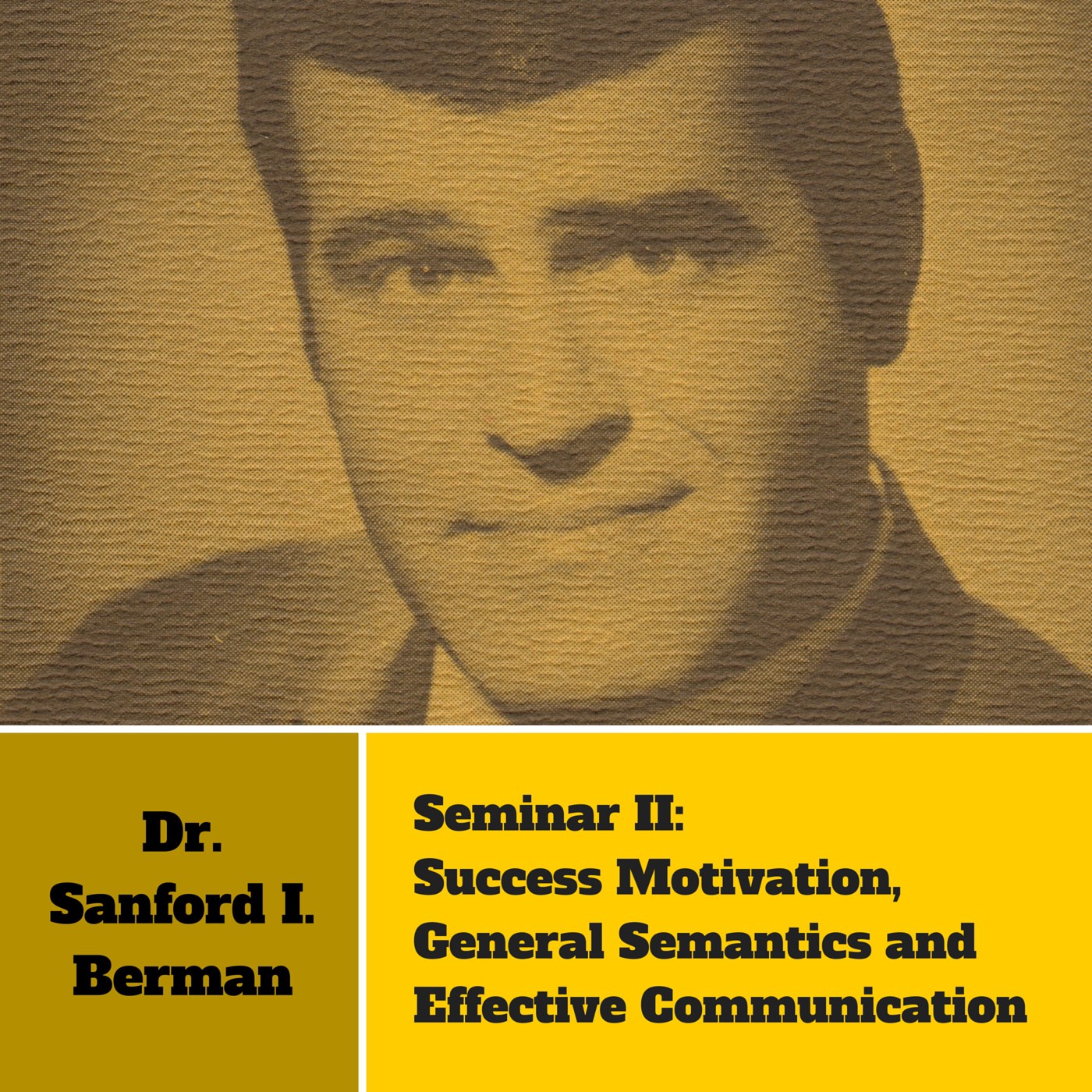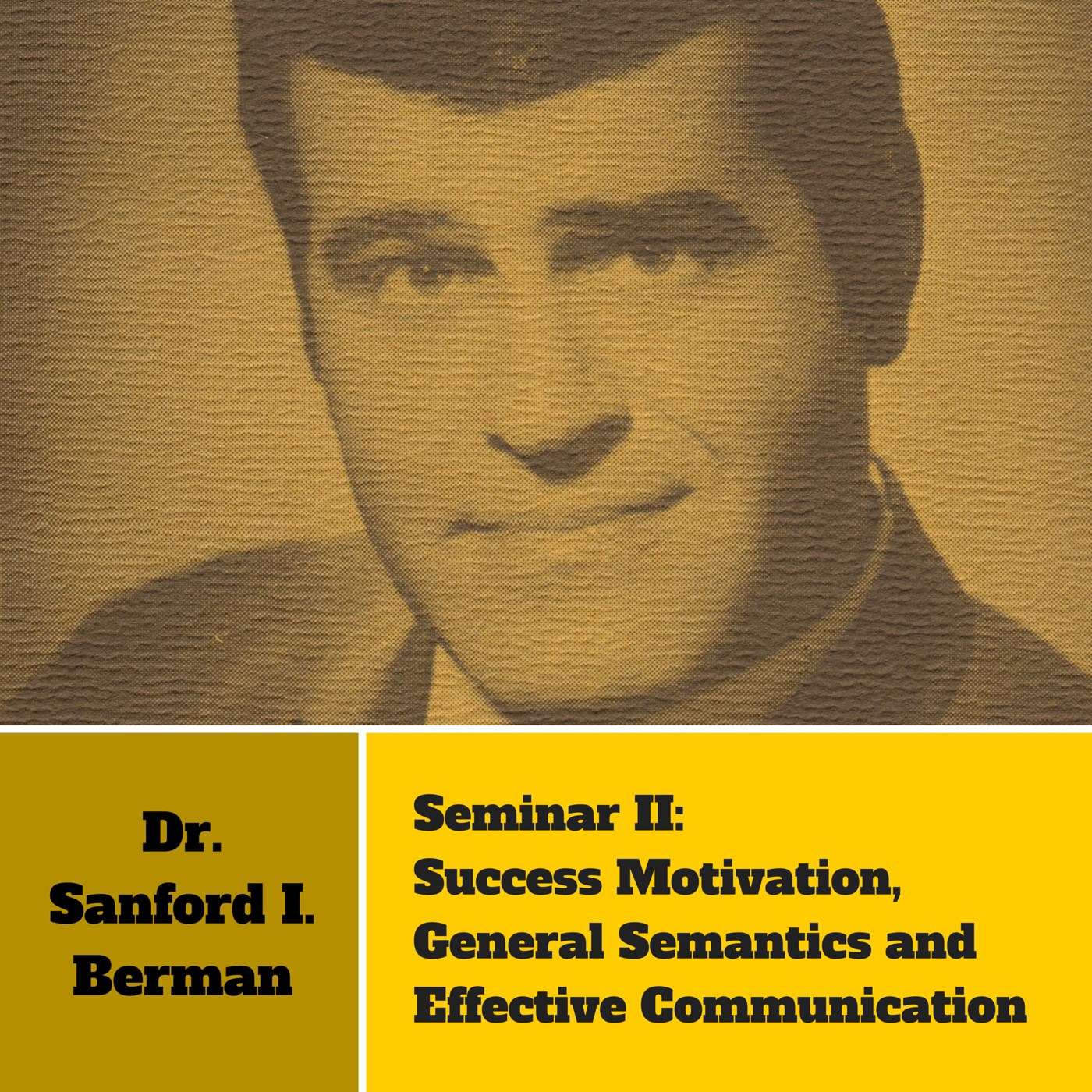1
/
of
1
generalsemanticsstore
MP3 Album: Success Motivation, General Semantics and Effective Communication Seminar
MP3 Album: Success Motivation, General Semantics and Effective Communication Seminar
Regular price
$30.00
Regular price
Sale price
$30.00
Unit price
/
per
Couldn't load pickup availability
Success Motivation, General Semantics and Effective Communication Seminar
by Dr. Sanford I. Berman
MP3 Album
10% of proceeds from the sale of this seminar will benefit the Dr. Sanford I. Berman Educational Foundation. Originally available as a 13-cassette audio series from his business Educational Cassettes, Inc., Dr. Sanford I. Berman has permitted the Institute of General Semantics to make his 1974 series available for download exclusively from the IGS Store. Dr. Sanford I. Berman (1924-2015) was a lecturer on Communications and General Semantics and Communications Consultant to business and industry. He was an instructor of Public Speaking and Psychology of Persuasion at the Illinois Institute of Technology, lecturer on General Semantics Communication at Northwestern University, and a lecturer on “Communication Skills Management” at the Management Development Seminar at the University of Chicago. More on Dr. Berman and the award in his name » [fusion_accordion type="accordions" boxed_mode="" border_size="1" border_color="" background_color="" hover_color="" divider_line="" icon_size="" icon_color="" icon_boxed_mode="" icon_alignment="" hide_on_mobile="small-visibility,medium-visibility,large-visibility" class="" id=""][fusion_toggle title="Click to View the Tracks and Topics" open="no"]II-1. A. WHAT IS SUCCESS? Definition of success. How to be inner-directed. Purpose of seminar. B. HOW TO THINK INTELLIGENTLY Semantics and general semantics. Four phases involved in human behavior. Proper and mis-evaluations. Intelligence and stupidity. Examples of mis-evaluations. Are you verbally or factually oriented? II-2. A. QUIZ ON HOW TO THINK Answers to quiz. True and false assumptions. How assumptions lead to behavior. Logical fate. Importance of unconscious assumptions. Reflex action. B. SIGNAL AND SYMBOL REACTIONS First barrier to effective communication. Reflex-like behavior. Animalistic and human behavior. How to pause, delay, and analyze situations. Intelligent behavior. How to think. II-3. A. THINK AND GROW RICH Your greatest power. The laws of success. How thoughts can become things. How to motivate yourself. How to profit from failure. B. HOW TO SET GOALS The importance of a burning desire. Importance of setting goals. Psychology of setting goals. How to turn desire into gold. II-4. A. STEPS TOWARD RICHES How to guard against negative people. Quotations on success. Importance of faith for success. How to achieve faith. Affirmations. The magic of self-suggestion. Importance of autosuggestion. How to influence your subconscious mind. Visualization and autosuggestion. B. CHARACTERISTICS OF LEADERSHIP Importance of knowledge. Generalized and specialized knowledge. How to organize and plan for success. Master mind principle. Major attributes of leadership. II-5. A. THE MAJOR CAUSES OF FAILURE How to get a job. What is your Q.Q.S. rating? Dangers of habit. Major causes of failure. Basic fears. B. HOW FEARS CREATE FAILURE Fear and anxiety. Effects of fear. Origin of fears. How do anxieties develop. Pessimism and anxiety. Strong and weak egos. Helplessness and anxiety. Weak ego and low self-image. How insecurity breeds fears. How to cope with fears. How to lessen anxiety. Anxiety and failure. II-6. A. HOW TO CONQUER FEAR AND CAUSES OF FAILURE Kinds of fears. How to overcome fears. Causes of failure. B. CAUSES OF FAILURE AND STEPS TOWARD RICHES Causes of failure. How to master procrastination. How to be persistent. Master mind principle. How to develop power. How to use sex energy for success. Power of the subconscious mind. Your brain and success. II-7. A. PSYCHO-CYBERNETICS What is psycho-cybernetics? How cybernetics works. Importance of self-image. Law of prosperity and happiness. How psycho-cybernetics works. How subconscious mind works. B. PSYCHO-CYBERNETICS Servo-mechanisms. Your success mechanism. Creative imagination. Self-hypnosis and false beliefs. Why we develop inferiority complexes. How to be happier. Your failure mechanism. The success type personality. II-8. A. QUIZ ON “WHY DO WE JUMP TO CONCLUSIONS?” Analysis and answers to quiz. The problem of jumping to conclusions. B. STATEMENTS OF FACT AND INFERENCE Analysis of factual and inferential statements. Five differentiating characteristics. Assumptions of certainty and probability. Why we jump to conclusions. The proper use of inferences. Conclusions for fact-inference principle. II-9. A. ALLNESS ORIENTATION: THE ASSUMPTION THAT WE KNOW IT ALL Other-fulfilling prophecy. Self-fulfilling prophecy. Can we know all about anything? Limiting factors. Abstracting. The allness orientation. The closed mind. Non-allness orientation. B. THE NEGATIVE MENTAL ATTITUDE Allness orientation. Negative mental attitude. Attitude: most important word for success. Positive mental attitude. How to acquire belief. What can we do about allness in others? II-10. A. QUIZ ON PROJECTION AND MISUNDERSTANDING Illustrations of misunderstandings. Answers to quiz. Language usage. B. WHY DO WE MISUNDERSTAND EACH OTHER? Projection or by-passing. “Is” of predication. Three kinds of projection. Assumptions of certainty and probability in communication. Do words contain meaning? How to less misunderstandings. Five listening responses. II-11. A. PSYCHOLOGY OF PERSUASION AND PUBLIC SPEAKING Objectives in selling or public speaking. Persuasion: your most important management skill. The law of the situation. How do you persuade believing, critical, hostile, apathetic, and sophisticated audience? How to give a speech. B. IMPORTANCE OF CHANGE, SEEING DIFFERENCES, AND SMALL TALK How language implies a static world. How to date your evaluations. Importance of differences. Horizontal and vertical identification. How to see differences through indexing. Scientific and unscientific method. Importance of small talk. Two kinds of silence. II-12. A. EXPECTATION, MOTIVATION, AND I.F.D. DISEASE Semantics of happiness. Four kinds of individuals. Why people are frustrated and unhappy. Positive expectancy. B. POSITIVE EXPECTANCY, NEEDS, AND MOTIVATION How to plan with positive expectancy. How to motivate yourself and others. Three kinds of motivation. Characteristics of a successful person. Primary and secondary drives. Basic needs that motivate successful people. II-13. A. HOW TO FIND MILLIION DOLLAR IDEAS Bernard Baruch’s five rules for money making. Acres of diamonds. Six magic words for success. How to increase your pay. Brainstorming. Brainstorming chart. How to find million dollar ideas. B. HOW TO REMEMBER NAMES AND FACES How to turn ideas into income. How to remember faces. How to remember names.[/fusion_toggle][/fusion_accordion] Available as a downloadable .zip file including 26 .mp3 audio files. (Note: The .zip file is 515 MB and will take a little time to download.) Originally available as 13 audio cassettes from Educational Cassettes, Inc., as Album II-A.
Shipping & Returns
Shipping & Returns
Share


